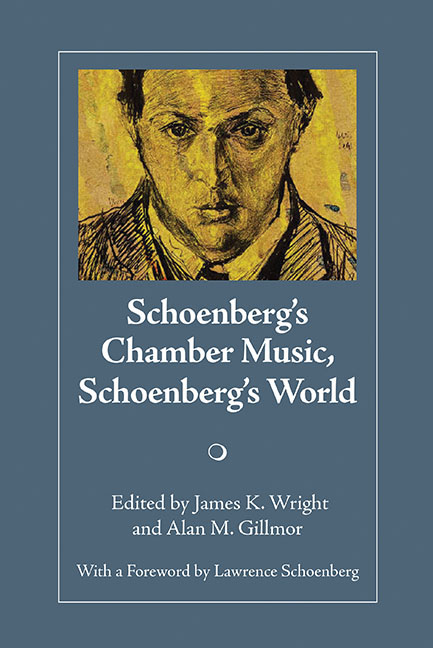Book contents
- Frontmatter
- Contents
- Foreword
- Preface
- HISTORICAL PERSPECTIVES
- ANALYTICAL PERSPECTIVES
- Schoenberg as Webern: The Three Pieces for Chamber Orchestra, III (1910)
- Juxtaposing Popular Music in the Second String Quartet, Op. 10
- A Chronology of Intros, an Enthrallogy of Codas: The Case of Schoenberg's Chamber Symphony, Op. 9
- Schoenberg's First Chamber Symphony, Formalism, and Adorno's Critique of Twelve-Tone Composition
- Precedents of Schoenberg's Compositional Practice in the Chamber Works of Joseph Haydn
- OTTAWA SYMPOSIUM AND CHAMBER MUSIC FESTIVAL PHOTOS
- PERFORMANCE, RECEPTION, AND INTERNATIONAL INFLUENCE
Precedents of Schoenberg's Compositional Practice in the Chamber Works of Joseph Haydn
from ANALYTICAL PERSPECTIVES
- Frontmatter
- Contents
- Foreword
- Preface
- HISTORICAL PERSPECTIVES
- ANALYTICAL PERSPECTIVES
- Schoenberg as Webern: The Three Pieces for Chamber Orchestra, III (1910)
- Juxtaposing Popular Music in the Second String Quartet, Op. 10
- A Chronology of Intros, an Enthrallogy of Codas: The Case of Schoenberg's Chamber Symphony, Op. 9
- Schoenberg's First Chamber Symphony, Formalism, and Adorno's Critique of Twelve-Tone Composition
- Precedents of Schoenberg's Compositional Practice in the Chamber Works of Joseph Haydn
- OTTAWA SYMPOSIUM AND CHAMBER MUSIC FESTIVAL PHOTOS
- PERFORMANCE, RECEPTION, AND INTERNATIONAL INFLUENCE
Summary
Arnold Schoenberg frequently resorted to citing works by canonic composers to elucidate similar traits in his own works. This mindset led him to argue that, among other things, Brahms was a “progressive” and Bach was a “twelvetone” composer. Schoenberg never took a similar stance on Joseph Haydn's music in his essays, but as will be seen his analyses of Haydn's music frequently demonstrate the ways in which he appropriated central traits of Haydn's style in his own works. This paper will investigate the extent of Schoenberg's interest in Haydn, and the relevance of this interest to Schoenberg's compositional practice. There are a number of striking parallels between the two composers’ practices, and these are especially evident in their respective chamber works. An examination of Schoenberg's analyses of Haydn's music and Schoenberg's approach to composition will demonstrate the ways in which Schoenberg adapted salient traits from Haydn's musical style in his own compositions, including the Second String Quartet in F-sharp minor, Op. 10.
Schoenberg had an extensive knowledge of Haydn's chamber music. He owned, analyzed, and even played many of Haydn's mature string quartets. While he appears to have been less familiar with most of Haydn's quartets prior to the Op. 20 set, there is ample evidence from in-score annotations and published analyses that he knew a large percentage of the quartets from Op. 20 all the way to the final Op. 77 set. Similarly, he knew many of Haydn's piano sonatas, though in this genre surviving evidence indicates that he had a detailed knowledge only of the works from Hob. XVI: 28-48. While Schoenberg owned the scores of a large number of Haydn's piano trios, the only work in this genre he ever analyzed was Hob. XV: 29.
Haydn's music stands out in Schoenberg's library for the large number of scores that contain handwritten analyses. A similar number of analyses appear in his scores of Bach, Beethoven, Brahms, Mahler, and Mozart. This indicates the esteem in which he held Haydn's music. More importantly it means that although Schoenberg would never write an extended essay on Haydn, we can nevertheless create a clear picture of Schoenberg's views on Haydn's music through these scores as well as his occasional references to Haydn in his essays and textbooks.
- Type
- Chapter
- Information
- Schoenberg's Chamber Music, Schoenberg's World , pp. 149 - 160Publisher: Boydell & BrewerPrint publication year: 2009



